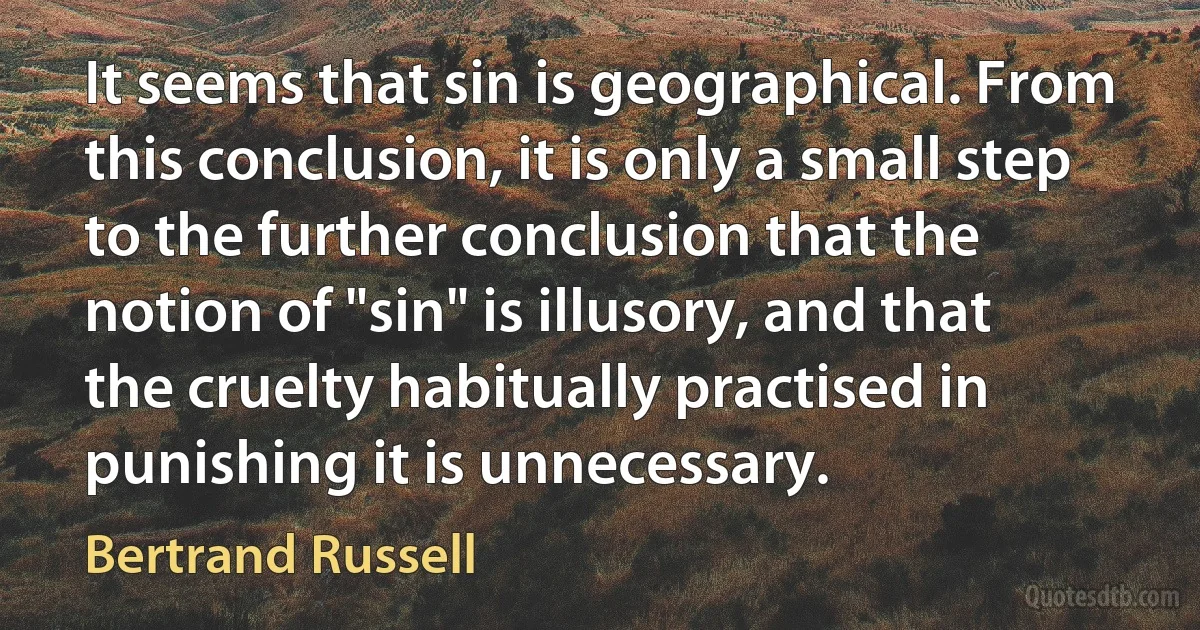Small Quotes - page 85
[T]he plan we are advocating amounts essentially to this: that a certain small income, sufficient for necessaries, should be secured to all, whether they work or not, and that a larger income, as much larger as might be warranted by the total amount of commodities produced, should be given to those who are willing to engage in some work which the community recognizes as useful.

Bertrand Russell
In this world, as in our own, nearly all the chief means of production, nearly all the land, mines, factories, railways, ships, were controlled for private profit by a small minority of the population. These privileged individuals were able to force the masses to work for them on pain of starvation. The tragic farce inherent in such a system was already approaching. The owners directed the energy of the workers increasingly toward the production of more means of production rather than to the fulfilment of the needs of individual life. For machinery might bring profit to the owners; bread would not. With the increasing competition of machine with machine, profits declined, and therefore wages, and therefore effective demand for goods. Marketless products were destroyed, though bellies were unfed and backs unclad. Unemployment, disorder, and stern repression increased as the economic system disintegrated. A familiar story!

Olaf Stapledon
Neither acquiescence in skepticism nor acquiescence in dogma is what education should produce. What it should produce is a belief that knowledge is attainable in a measure, though with difficulty; that much of what passes for knowledge at any given time is likely to be more or less mistaken, but that the mistakes can be rectified by care and industry. In acting upon our beliefs, we should be very cautious where a small error would mean disaster; nevertheless it is upon our beliefs that we must act. This state of mind is rather difficult: it requires a high degree of intellectual culture without emotional atrophy. But though difficult, it is not impossible; it is in fact the scientific temper. Knowledge, like other good things, is difficult, but not impossible; the dogmatist forgets the difficulty, the skeptic denies the possibility. Both are mistaken, and their errors, when widespread, produce social disaster.

Bertrand Russell
It is normal to hate what we fear, and it happens frequently, though not always, that we fear what we hate. I think it may be taken as the rule among primitive men, that they both fear and hate whatever is unfamiliar. They have their own herd, originally a very small one. And within one herd, all are friends, unless there is some special ground of enmity. Other herds are potential or actual enemies; a single member of one of them who strays by accident will be killed. An alien herd as a whole will be avoided or fought according to circumstances. It is this primitive mechanism which still controls our instinctive reaction to foreign nations. The completely untravelled person will view all foreigners as the savage regards a member of another herd. But the man who has travelled, or who has studied international politics, will have discovered that, if his herd is to prosper, it must, to some degree, become amalgamated with other herds.

Bertrand Russell
In the past, there was a small leisure class and a larger working class. The leisure class enjoyed advantages for which there was no basis in social justice; this necessarily made it oppressive, limited its sympathies, and caused it to invent theories by which to justify its privileges.

Bertrand Russell
[T]here should be a heavily progressive National inheritance tax on big fortunes. The really big fortune, by the mere fact of its size, acquires qualities which differentiate it in kind as well as in degree from what is possessed by men of relatively small means. A heavily progressive inheritance tax on all such fortunes (heaviest on absentees) has the good qualities of an income tax, without its drawbacks; it is far more beneficial to the community at large, and far less burdensome to private individuals, as well as far more easily collected. A moderate, but progressive, income tax, carefully devised to fall genuinely on those who ought to pay, would, I believe, he a good thing; but a heavy and heavily progressive inheritance tax on great fortunes would be a far better thing.

Theodore Roosevelt
The absence of effective State, and, especially, national, restraint upon unfair money-getting has tended to create a small class of enormously wealthy and economically powerful men, whose chief object is to hold and increase their power. The prime need to is to change the conditions which enable these men to accumulate power which it is not for the general welfare that they should hold or exercise.

Theodore Roosevelt
I insist on establishing the following dates indicating my prior paternity, [and the discussions that I held]
1884, 'Grande Jatte' study, exhibition of the Independants
1884-1885, 'Grande Jatte' composition
1885, studies at the 'Grande Jatte' and at Grandcamp; I took up again the 'Grande Jatte' composition October 1886. 4 October [18]85 I make Pissarro's acquaintance at Durand-Ruel's.
1886, January or February, a small canvas by Pissarro, divided and pure color, at Clozet's, the dealer on the Rue de Chateaudun.

Georges Seurat
Much has been given us, and much will rightfully be expected from us. We have duties to others and duties to ourselves; and we can shirk neither. We have become a great nation, forced by the fact of its greatness into relations with the other nations of the earth, and we must behave as beseems a people with such responsibilities. Toward all other nations, large and small, our attitude must be one of cordial and sincere friendship. We must show not only in our words, but in our deeds, that we are earnestly desirous of securing their good will by acting toward them in a spirit of just and generous recognition of all their rights. But justice and generosity in a nation, as in an individual, count most when shown not by the weak but by the strong.

Theodore Roosevelt
Nobody should start to undertake a large project. You start with a small trivial project, and you should never expect it to get large. If you do, you'll just overdesign and generally think it is more important than it likely is at that stage. Or worse, you might be scared away by the sheer size of the work you envision. So start small, and think about the details. Don't think about some big picture and fancy design. If it doesn't solve some fairly immediate need, it's almost certainly over-designed. And don't expect people to jump in and help you. That's not how these things work. You need to get something half-way useful first, and then others will say "hey, that almost works for me", and they'll get involved in the project.

Linus Torvalds
This war had its roots in the disregard of the rights of small nations and of nationalities which lacked the union and the force to make good their claim to determine their own allegiances and their own forms of political life. Covenants must now be entered into which will render such things impossible for the future; and those covenants must be backed by the united force of all the nations that love justice and are willing to maintain it at any cost.

Woodrow Wilson
I am a most unhappy man. I have unwittingly ruined my country. A great industrial nation is controlled by its system of credit. Our system of credit is concentrated. The growth of the nation, therefore, and all our activities are in the hands of a few men. We have come to be one of the worst ruled, one of the most completely controlled and dominated governments in the civilized world: no longer a government by free opinion, no longer a government by conviction and the vote of the majority, but a government by the opinion and duress of a small group of dominant men.

Woodrow Wilson
It is a fearful thing to lead this great peaceful people into war, into the most terrible and disastrous of all wars, civilization itself seeming to be in the balance. But the right is more precious than peace, and we shall fight for the things which we have always carried nearest our hearts - for democracy, for the right of those who submit to authority to have a voice in their own governments, for the rights and liberties of small nations, for a universal dominion of right by such a concert of free peoples as shall bring peace and safety to all nations and make the world itself at last free. To such a task we can dedicate our lives and our fortunes, everything that we are and everything that we have, with the pride of those who know that the day has come when America is privileged to spend her blood and her might for the principles that gave her birth and happiness and the peace which she has treasured. God helping her, she can do no other.

Woodrow Wilson
Imagine a world where speaking or writing words can literally and directly make things happen, where getting one of those words wrong can wreak unbelievable havoc, but where with the right spell you can summon immensely powerful agencies to work your will. Imagine further that this world is administered: there is an extensive division of labour, among the magicians themselves and between the magicians and those who coordinate their activity. It's bureaucratic, and also (therefore) chaotic, and it's full of people at desks muttering curses and writing invocations, all beavering away at a small part of the big picture. The coordinators, because they don't understand what's going on, are easy prey for smooth-talking preachers of bizarre cults that demand arbitrary sacrifices and vanish with large amounts of money. Welcome to the IT department.

Charles Stross
Big industry, freed from the pressure of private property, will undergo such an expansion that what we now see will seem as petty in comparison as manufacture seems when put beside the big industry of our own day. This development of industry will make available to society a sufficient mass of products to satisfy the needs of everyone. The same will be true of agriculture, which also suffers from the pressure of private property and is held back by the division of privately owned land into small parcels. Here, existing improvements and scientific procedures will be put into practice, with a resulting leap forward which will assure to society all the products it needs. In this way, such an abundance of goods will be able to satisfy the needs of all its members.

Friedrich Engels
You have destroyed the small monopolies so that the one great basic monopoly, property, may function the more freely and unrestrictedly. You have civilised the ends of the earth to win new terrain for the deployment of your vile avarice. You have brought about the fraternisation of the peoples – but the fraternity is the fraternity of thieves.

Friedrich Engels



